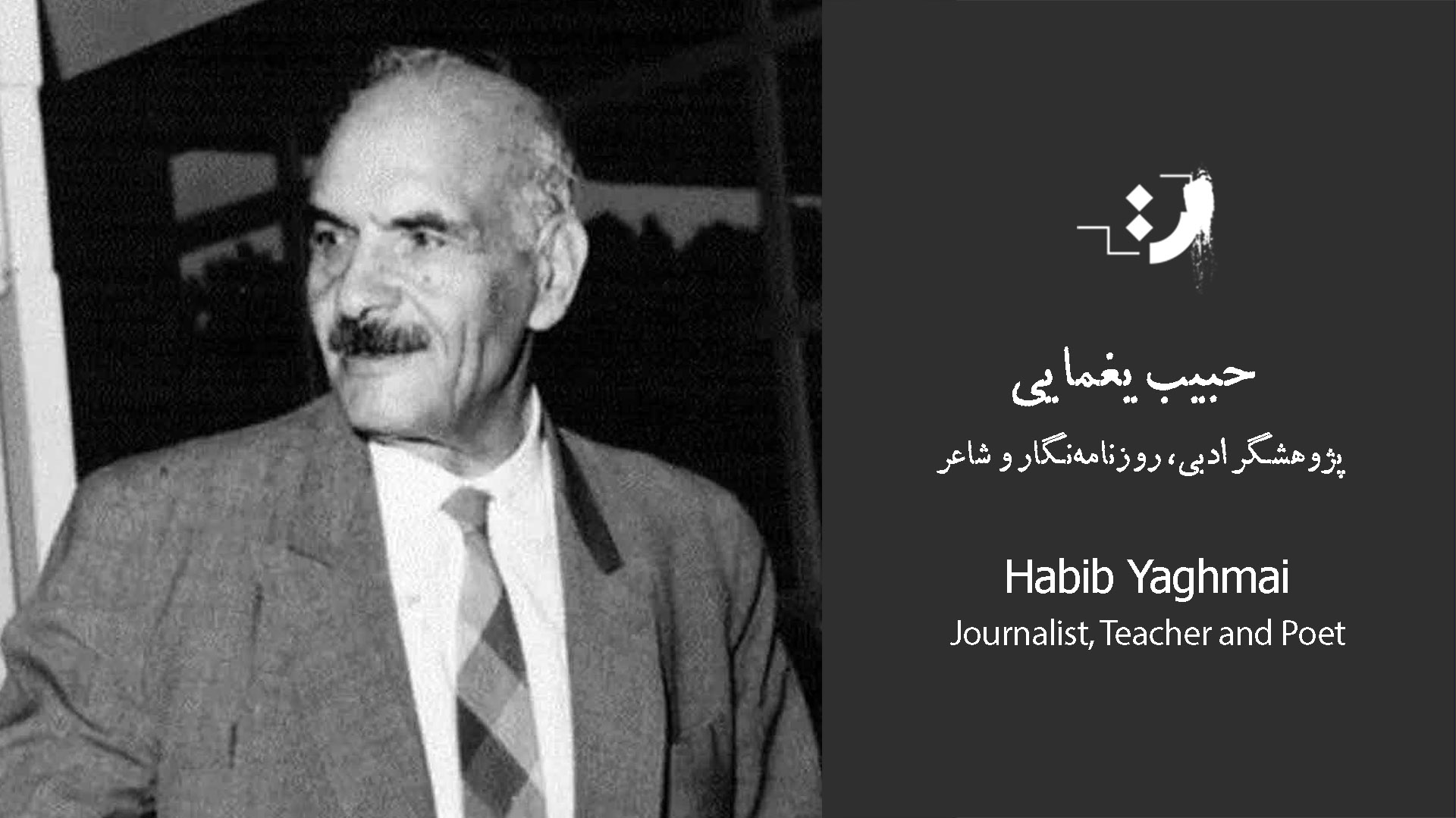Habib Yaghmai

Biography
Habib Yaghma’i (1901–1984) was an Iranian poet, scholar, and journalist, widely known for his literary and historical contributions. Born in the village of Khur, the capital of the Jandaq and Biyabanak district, he was the son of Mirza Asad Allah Muntakhab al-Sadat Khuri and the maternal grandson of the celebrated poet Yaghma-yi Jandaqi. His pen name was Habib.
Yaghma’i received his early education in Khur, where his poetic talent emerged from a young age. In 1916, he moved to Damghan to pursue formal education, studying Arabic, Persian literature, and modern sciences for three years at the Sa’adat and Nazimiyya schools under the guidance of ‘Abd Allah Khan Yasa’i. He continued his studies in Shahrud for two years before relocating to Tehran in 1921, where he attended the Alliance School and Dar al-Shifa’ and later graduated from the Teachers’ Training College (Dar al-Mu’allimin) with a focus on Persian literature.
In Tehran, he was mentored by renowned figures such as Abbas Iqbal and Abul-Hasan Forughi, both of whom greatly influenced his academic path. In 1923, he became a member of the Iran Literary Society and began contributing to the Tufan newspaper, edited by Farrokhi Yazdi. His first book, Sharh-i Hal-i Yaghma va Jughrafiya-yi Jandaq va Biyabanak, with an introduction by Abbas Iqbal, was published in 1925.
Yaghma’i’s career in education and government spanned several decades. He served as director of education in Semnan (1927–1928) and later returned to Khur to lead the local Vital Statistics Office. After returning to Tehran in 1929, he taught at several high schools and the prestigious Dar al-Funun Polytechnic. He co-authored Sukhanvaran-i Iran dar ‘Asr-i Hazir with Indian scholar Muhammad Ishaq, a two-volume collection on contemporary Iranian poets, published in Calcutta.
In 1930, he completed Dakhmih-yi Arghavan, a historical and romantic novel. Four years later, he joined the Publication Department of the Ministry of Education. Despite suffering from neurological ailments beginning in 1935, Yaghma’i collaborated closely with Muhammad ‘Ali Furughi on the preparation of critical editions of Persian literary classics, including Kulliyat-i Sa’di, Garshaspnamih by Asadi Tusi, and selected versions of Ferdowsi’s Shahnamih—a task he completed alone after Forughi’s death.
Yaghma’i held various administrative posts, including head of education in Kerman, inspector at the Ministry of Education under Prime Minister Mohammad Mossadegh, and director of the Publication Department during Mahdi Azar’s tenure as education minister. In 1948, he launched Yaghma, a highly influential literary journal that continued publication for over three decades.
His scholarly output was vast and diverse. He edited and published important classical texts, including the Tafsir-i Tabari (7 vols.), Qisas al-Anbiya’ by Abu Ishaq Nayshaburi, and Divan-i Manuchihri-yi Damghani. He wrote and edited textbooks, such as ‘Ilm-i Qafiyih, and published numerous literary and historical articles. Among his other significant publications are Madinih-yi Payghambar, a poetic travelogue of his pilgrimage to Mecca and Medina, Manzumih-yi Nabina’i—a verse autobiography detailing his experiences in London, and Karnamih-yi Kirman, a poetic account of Kerman.
He also collaborated with other scholars, notably Iraj Afshar, in projects like Nimunih-yi Nazm va Nasr-i Farsi and Maqalat-i Furughi. His editorial contributions extended to Namih-yi Farhang, Namih-yi Farhangistan, and Amuzish va Parvarish.
Yaghma’i was awarded an honorary doctorate from the Faculty of Letters and Humanities at the University of Tehran. He also taught at higher education institutions such as the College of Higher Studies (Danishsara-yi ‘Ali) and the Higher School of Letters and Foreign Languages (Madrisih-yi ‘Ali-yi Adabiyyat va Zabanha-yi Khariji), offering courses in poetics, rhyme, and literary devices.
His lifelong dedication to culture and education included founding a public library with separate reading rooms in Khur and Biyabanak. Over his career, he authored or edited over 140 scholarly works, including 51 literary, 39 historical and geographical studies, 149 book reviews, 31 social articles, and 24 editorials.
Habib Yaghma’i passed away in 1984 and was buried in a tomb he had built for himself on Tappeh-ye Gach (Lime Hill) in his native Khur va Biyabanak.
- Birthday: 1901
- Death: 1984
- Birthplace: Tehran, Tehran, Iran
Journalist, Teacher and Poet
